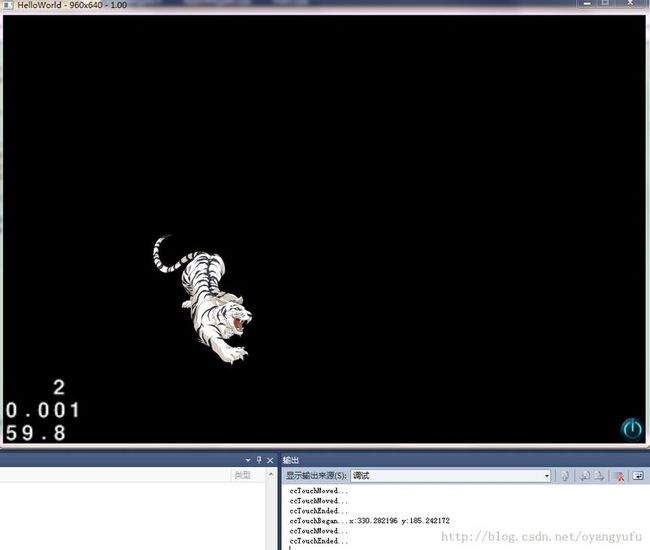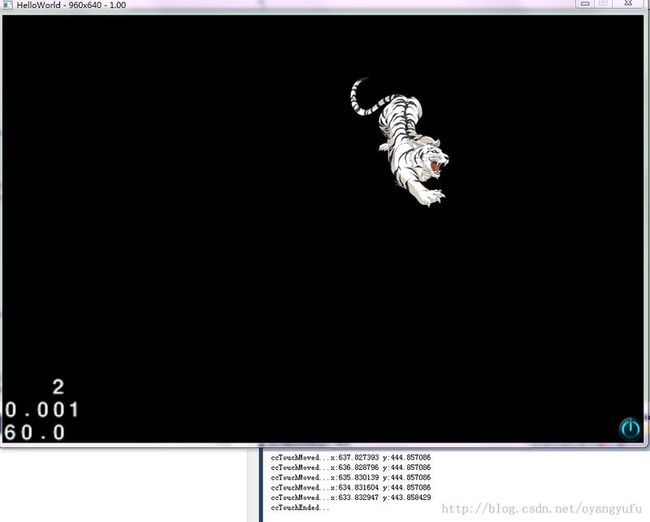Cocos2d-x 单点触摸--让我们用手指动起来的精灵
转载请注明出处:http://blog.csdn.net/oyangyufu/article/details/25656673
效果图:
CCTouch类装载了触摸点的信息。包含触摸点的横纵坐标值和触摸点的ID号,如获取触摸点转GL坐标:
CCPoint point = pTouch->getLocationInView(); point = CCDirector::sharedDirector()->convertToGL(point);
创建触摸事件流程:首先开启setTouchEnabled(true), 然后重写registerWithTouchDispatcher调用触摸代理函数addTargetedDelegate同意布景层接收触摸事件,再重写ccTouchBegan、ccTouchMoved、ccTouchEnded、ccTouchCancelled函数
程序代码:
bool HelloWorld::init()
{
//////////////////////////////
// 1. super init first
if ( !CCLayer::init() )
{
return false;
}
CCSize visibleSize = CCDirector::sharedDirector()->getVisibleSize();
CCPoint origin = CCDirector::sharedDirector()->getVisibleOrigin();
/////////////////////////////
// 2. add a menu item with "X" image, which is clicked to quit the program
// you may modify it.
// add a "close" icon to exit the progress. it's an autorelease object
CCMenuItemImage *pCloseItem = CCMenuItemImage::create(
"CloseNormal.png",
"CloseSelected.png",
this,
menu_selector(HelloWorld::menuCloseCallback));
pCloseItem->setPosition(ccp(origin.x + visibleSize.width - pCloseItem->getContentSize().width/2 ,
origin.y + pCloseItem->getContentSize().height/2));
// create menu, it's an autorelease object
CCMenu* pMenu = CCMenu::create(pCloseItem, NULL);
pMenu->setPosition(CCPointZero);
this->addChild(pMenu, 1);
setTouchEnabled(true);
sp1 = CCSprite::create("cpp1.png");
sp1->setScale(0.5f);
sp1->setPosition(ccp(100, 200));
this->addChild(sp1);
return true;
}
//触摸移动
void HelloWorld::ccTouchMoved(CCTouch* touch, CCEvent* event)
{
if (iscontrol)
{
CCPoint location = touch->getLocationInView();
location = CCDirector::sharedDirector()->convertToGL(location);
CCLOG("ccTouchMoved...x:%f y:%f", location.x, location.y);
//移动时又一次设置sprite坐标
float x = location.x-deltax;
float y = location.y-deltay;
sp1->setPosition(ccp(x, y));
}
}
//触摸開始点击,计算该点坐标与sprite坐标差值
bool HelloWorld::ccTouchBegan(CCTouch* touch, CCEvent* event)
{
CCPoint pos = sp1->getPosition();
CCPoint location = touch->getLocationInView();
location = CCDirector::sharedDirector()->convertToGL(location);//openGL
CCLOG("ccTouchBegan...x:%f y:%f", location.x, location.y);
if (location.x > 0 && location.x <960 &&
location.y >0 && location.y < 640)//触摸的矩形区域
{
iscontrol = true;
//计算触摸点与sprite的坐标差值
deltax = location.x-pos.x;
deltay = location.y-pos.y;
}
return true;
}
//触摸结束
void HelloWorld::ccTouchEnded(CCTouch* touch, CCEvent* event)
{
CCLOG("ccTouchEnded...");
//iscontrol = false;
}
//注冊触摸事件
void HelloWorld::onEnter()
{
CCDirector* pDirector = CCDirector::sharedDirector();
pDirector->getTouchDispatcher()->addTargetedDelegate(this, 0, true);
CCLayer::onEnter();
}
void HelloWorld::onExit()
{
CCDirector* pDirector = CCDirector::sharedDirector();
pDirector->getTouchDispatcher()->removeDelegate(this);
CCLayer::onExit();
}
版权声明:本文博客原创文章,博客,未经同意,不得转载。

